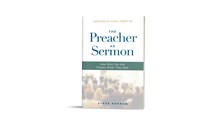
One Sunday, in the middle of the third point of my sermon, I lost my nerve.
For two days, doubts about the usefulness of the message had whispered darkly in the back of my mind, but I pushed ahead, ever the good soldier, ever mindful that Sunday was coming.
But on Sunday, at a precise point in time, I mentally bolted! Outwardly I kept preaching — faster, I think, and, perhaps, in a lifeless manner; I was gunning for the benediction. Inwardly, though, I was AWOL. I checked out.
What happened?
I had lost faith — the willful act of believing God is in the sermon — that he can use even my words. I lost my nerve.
After the benediction I made a beeline down the aisle and through the foyer to my study, without so much as a nod at an usher. I closed the door, locked it, and crumbled. Another service started in a few minutes, and I didn't know what to do. What I did, of course — what all preachers do — was preach once again, as well as I could with renewed dependence (a desperate dependence) on God to make his Word clear out of the jumble of my sermon.
Lessons in nerve loss
Time and again I have reflected on that experience, and this much is clear:
- It isn't preaching if there is no active faith at work. Then it's a lecture, a talk. Preaching is, by definition, an act of faith. That means there must be room for doubt and failure. Part of preparation, as surely as exegesis and outlining are, is activating our faith, that God will work through this message by his Spirit. That involves not only believing God can work in the sermon as a whole but also in its individual parts. I now pray through each sermon element, testing it before God, and then trusting him with it.
- Feeling vulnerable is part of the package. That is one reason preaching can be so powerful. It isn't a scholarly lecture reporting research results. A sermon is our personal response to the " living and active " Word of God. A loss for words — and thus an exposure of our hearts — must be expected.
- Confidence comes from outside us. Even the most Bible-devoted preacher can traffic too much in the realm of personal thoughts and musings. Such thoughts may be theologically solid and pastorally wise, but it's the Text that is our stock in trade. Our task is to make the text's meaning clear and then let God speak for God.
Preaching is not for the faint of heart. Preaching nerve doesn't come from self-confidence but from Word-confidence. When I forget that, I start sinking, wide-eyed, into the waves of doubt. When I remember that, I can walk on water.











